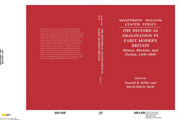Book contents
- Frontmatter
- Contents
- Preface
- WOODROW WILSON CENTER SERIES
- 1 Introduction
- 2 Precept, example, and truth: Degory Wheare and the ars historica
- 3 Truth, lies, and fiction in sixteenth-century Protestant historiography
- 4 Thomas More and the English Renaissance: History and fiction in Utopia
- 5 Little Crosby and the horizons of early modern historical culture
- 6 Murder in Faversham: Holinshed's impertinent history
- 7 Foul, his wife, the mayor, and Foul's mare: The power of anecdote in Tudor historiography
- 8 Experience, truth, and natural history in early English gardening books
- 9 Thomas Hobbes's Machiavellian moments
- 10 The background of Hobbes's Behemoth
- 11 Leviathan, mythic history, and national historiography
- 12 Protesting fiction, constructing history
- 13 Adam Smith and the history of private life: Social and sentimental narratives in eighteenth-century historiography
- 14 Contemplative heroes and Gibbon's historical imagination
- Contributors
- Index
- Titles in the series
7 - Foul, his wife, the mayor, and Foul's mare: The power of anecdote in Tudor historiography
Published online by Cambridge University Press: 04 August 2010
- Frontmatter
- Contents
- Preface
- WOODROW WILSON CENTER SERIES
- 1 Introduction
- 2 Precept, example, and truth: Degory Wheare and the ars historica
- 3 Truth, lies, and fiction in sixteenth-century Protestant historiography
- 4 Thomas More and the English Renaissance: History and fiction in Utopia
- 5 Little Crosby and the horizons of early modern historical culture
- 6 Murder in Faversham: Holinshed's impertinent history
- 7 Foul, his wife, the mayor, and Foul's mare: The power of anecdote in Tudor historiography
- 8 Experience, truth, and natural history in early English gardening books
- 9 Thomas Hobbes's Machiavellian moments
- 10 The background of Hobbes's Behemoth
- 11 Leviathan, mythic history, and national historiography
- 12 Protesting fiction, constructing history
- 13 Adam Smith and the history of private life: Social and sentimental narratives in eighteenth-century historiography
- 14 Contemplative heroes and Gibbon's historical imagination
- Contributors
- Index
- Titles in the series
Summary
We all know, or think we do, what an anecdote is, and in disciplines that assume or aspire to the scientific use of evidence the value of the anecdote has for centuries been low. In the late twentieth century, the aspirations of history to scientificity have risen, as witness the respect for statistics in social history, the lost prestige of intellectual history, and the avoidance in political history of large theoretical generalizations. Accordingly the phrase “only anecdotal,” which has always implied unreliable information, has a comforting meaning in history, as it does also in law and medicine, conveying the notion that beyond the anecdotal lies objective and neatly serried fact.
Yet there are signs within history, as also within law and medicine, that the assumptions demanding the exclusion of the anecdotal from legitimate evidence are due for interrogation. Some of the pressure has been coming, of course, from the various attempts in literary studies to reinflect that discipline with historical knowledge. The so-called new historicism pioneered by Stephen Greenblatt is perhaps only recognizable as a movement by its reliance on the colorful anecdote, which (precisely because of these new historicist claims) can provoke protests from conservative literary critics. Thus Brian Vickers, after reproaching Greenblatt for misusing the anthropological techniques of Clifford Geertz, remarks: “The dangers of this elevation of the anecdotal to a central status are clear, encouraging as it does the use of interesting little stories not as ornaments to the text but as load-bearing props in the argument, a role to which they are unsuited.”
- Type
- Chapter
- Information
- The Historical Imagination in Early Modern BritainHistory, Rhetoric, and Fiction, 1500–1800, pp. 159 - 178Publisher: Cambridge University PressPrint publication year: 1997
- 2
- Cited by

